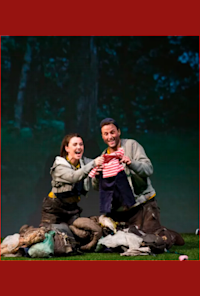The Magic Flute by Mozart, From (2022/2022), Directed by Robert Carsen,, Conductor Antonello Manacorda, Simone Di Felice, Opéra Bastille, Paris, France
Producer
Conductor
AM(2022 Sep 17, 20, 22, 28, 30; Oct 04, 08, 13; Nov 04, 13, 16, 19)

(2022 Oct 19, 22, 28)
Stage director
Cast
Tamino

(2022 Sep 17, 20, 22, 28, 30; Oct 04, 08, 13, 19)

(2022 Oct 22, 28; Nov 04, 13, 16, 19)
Papageno

(2022 Sep 17, 20, 22, 28, 30; Oct 04, 08, 13, 19)

(2022 Oct 22, 28; Nov 04, 13, 16, 19)
Pamina
PY(2022 Sep 17, 20, 22, 28, 30; Oct 04, 08, 13)

(2022 Oct 19, 22, 28; Nov 04, 13, 16, 19)
Königin der Nacht
(The Queen of the Night)
CW(2022 Sep 17, 20, 22, 28, 30; Oct 04, 08, 13, 19)
Sarastro
RP(2022 Sep 17, 20, 22, 28, 30; Oct 04, 08, 13)

(2022 Oct 19, 22, 28; Nov 04, 13, 16, 19)
Monostatos
(Monostastos)
Sprecher
(Speaker)
MG(2022 Sep 17, 20, 22, 28, 30; Oct 04, 08, 13, 19, 22)
MK(2022 Oct 28; Nov 04, 13, 16, 19)
Erster Priester
(First priest)
Zweiter Priester
(Second priest)
Erste Dame
(First lady)
Zweite Dame
(Second lady)
Dritte Dame
(Third lady)
Crew
Lighting designer
Video
Dramaturge
Chorus master
Costume designer
Set designer
Ensemble
Orchestra
Co-Producer
Co-Producer










